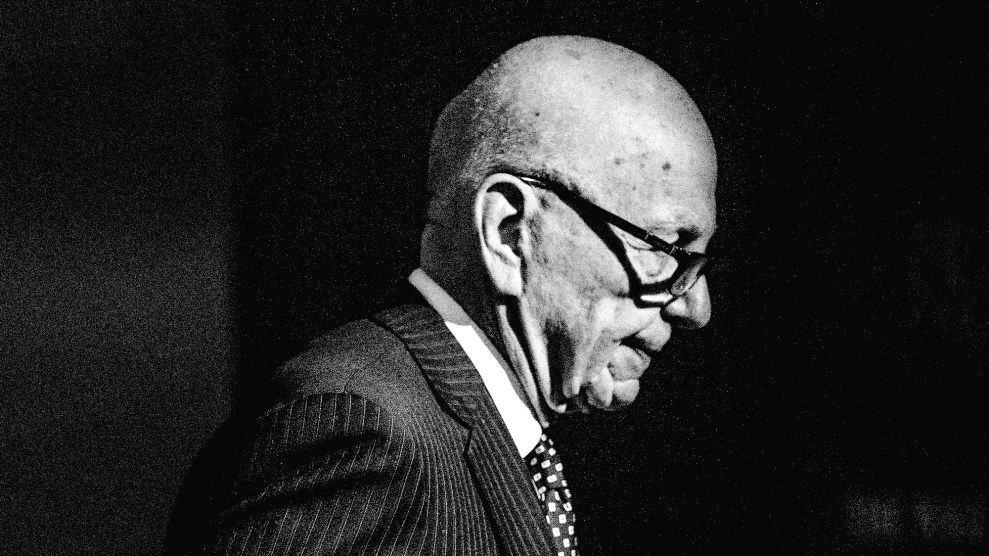Janeane Garofalo disdains celebrities who stump for political causes, but that hasn’t kept the versatile comedienne and actress from tackling political roles. In her newest film, Steal This Movie!, Garofalo stars as the wife of ’60s radical Abbie Hoffman. The indie biopic — which chronicles the turbulent life of the yippie leader — gave Garofalo an opportunity to showcase both her dramatic talents and her lefty credentials. She spoke to us from a summer camp in Pennsylvania where she was shooting Wet Hot American Summer, a comedy.
Mother Jones: Steal This Movie! is your first overtly political film. What drew you to play Anita Hoffman?
Janeane Garofalo: My politics are very liberal, so I love the era for obvious reasons. And I always had that image of Abbie Hoffman and the American flag shirt in my mind when I was younger. But it was also the role. I don’t get the opportunity to play many principal dramatic parts. And I’ve never played somebody who’s still alive — though Anita passed on last Thanksgiving. I figured it was an opportunity I couldn’t pass up, so I basically begged Robert [Greenwald], the director, to let me play it.
MJ: Was he surprised that you were interested?
JG: No, it was his labor of love. I think he’d be surprised if you weren’t interested.
MJ: You were a child during many of the events of this film. What do you remember about the ’60s?
JG: I was born in ’64. I remember my brother playing a prank on me and claiming I had been drafted. I was so upset. I believed him. I remember the Chicago Seven trial. I remember Hanoi Jane. I remember Nixon addressing the country. And I remember that even though my parents were very young, they were very conservative. They weren’t swept up in the ’60s revolution at all.
MJ: How did you reimmerse yourself in ’60s counterculture?
JG: I was very well read on the topic anyway. I just read more: all of Abbie’s books, Tom Hayden’s book, Anita’s book. I got eight tapes from Anita telling me about their lives.
MJ: What about Abbie Hoffman inspires you the most?
JG: Question authority — if you want a button issue. But the most important aspect of it is the civil rights work that Abbie and his cohorts did.
MJ: Hoffman was one of the first people to really understand the concept of mass media and how to take advantage of it politically.
JG: Abbie Hoffman welcomed any and all publicity. He would have killed to have his photo taken all the time and to be interviewed. So a lot of things he did were for ham reasons, and a lot of things he did were for the right reasons. He was a player. He worked it. People like Tom Hayden and Dave Dellinger — who was one of the Chicago Seven — they shunned that. Not all of them got along with Abbie very well for that reason.
MJ: Do you enjoy the exposure that your celebrity affords you?
JG: I actually don’t enjoy being photographed or doing interviews — no offense. It makes me embarrassed to be under that kind of focus. I feel like, Who the fuck cares what I think?
MJ: But as a public figure, you must have to choose whether to use your position to speak out about different issues.
JG: I try to avoid it, because it actually has the opposite effect. I think people are very cynical with actors trying to tell them what to believe in, or lobbying for any kind of changing of government policy. Even I get cynical about it. Like, Why is Sharon Stone telling me this? And there’s just something annoying about having Charlie Sheen tell me, “It’s your responsibility to vote,” in an admonishing way on MTV.
MJ: I always think of Richard Gere and Tibet.
JG: Exactly. Mr. Enlightened. He’s totally enlightened except that his girlfriends are still 20 years younger and in the modeling industry.
MJ: One thing you have been outspoken about is the way Hollywood portrays women.
JG: That’s not grandstanding, because I live it. I am a victim of it. I’m talking about my personal, negative experiences.
MJ: But you don’t see yourself as a role model for the young women of America?
JG: I don’t see myself as a role model in any way. I would be flattered if anybody thought that I was, but I really don’t think that’s the case.
MJ: Don’t you think you’re skirting the line a bit by doing such a political movie?
JG: I’m comfortable doing a political film for the left. If somebody cast me in The Charlton Heston Story, I probably wouldn’t do it.











